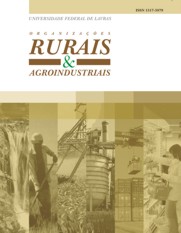IMPORTANCE OF INFORMAL INSTITUTIONS IN INSTITUTIONAL ARRANGEMENTS WITH SMALL PRODUCERS: CASE OF TABLE GRAPES IN THE REGION OF JALES, SAO PAULO, BRAZIL
Resumo
In 2011, the largest Brazilian states to produce table grapes were Pernambuco and São Paulo. The region of Jales, a city located in the northwestern region of São Paulo, is the largest producer of fine table grapes. In this region, producers work exclusively with wholesalers (CEAGESP), passing through an intermediary called mateiro. To verify the importance of this intermediary, the objective of the research has been to analyze and understand the functioning of institutional arrangements used by grape growers in the region of Jales to market their production. Has been used a model that combines formal and informal institutions with the model of Transaction Cost Economics (TCE). A questionnaire was conducted with 41 producers and 5 purchasers of table grapes in the region of Jales. Producers depend of CEAGESP to commercialize and have some asset specificity, different from that of wholesalers. Hybrid arrangements are recommended, with necessity of guarantees for the producers. Formal contracts do not work well with small producers, as they do not know the wholesalers, which increases the difficulty of establishing informal guarantees. Nevertheless, producers considered their products as delivered to the mateiros, with whom they established lasting relationships of trust. Therefore, the figure of an intermediary between producers and wholesalers, given the existence of social capital, allowed for the creation of informal guarantees and the reduction of transaction costs.


